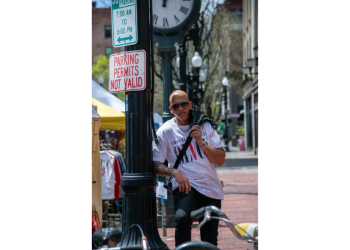“I do want to admonish the government for frankly wasting the court’s time,” Cannon said, adding that she was “disappointed” that one of the arguments made by assistant special counsel David Harbach hadn’t been mentioned in earlier court filings.
The complication emerged at the second of two hearings scheduled for Carlos De Oliveira and Waltine Nauta — two Trump employees charged with allegedly helping the former president obstruct government attempts to retrieve classified materials that he had in his possession.
During the first hearing, Cannon pressed De Oliveira, the property manager at Trump’s Mar-a-Lago residence and private club, to make sure he understood the implications of his lawyer having previously represented three potential witnesses in the case.
De Oliveira, an immigrant from Portugal, said in imperfect English that he understood the conflict-of-interest concerns raised by prosecutors but nevertheless wanted to proceed with his lawyer, John Irving — even if that decision meant he couldn’t appeal over the lawyer issue later on.
“I don’t have a problem” with the possibilities of which of his lawyers might question certain trial witnesses, De Oliveira told the judge.
After a hearing that lasted more than an hour, Cannon accepted De Oliveira’s waiver of a potential conflict and said he could proceed with Irving as his lawyer. Irving has argued there is no real conflict and said prosecutors had made too much of the issue.
Once De Oliveira’s hearing ended, lawyers in the case prepared to conduct a similar exercise for Nauta, Trump’s longtime valet and personal aide.
But Cannon expressed frustration that prosecutors had raised a new legal argument that hadn’t been briefed in their court filings. She told them they would have to conduct the Nauta hearing another time.
The type of hearing — known as a Garcia hearing — is routine in criminal proceedings. Even if the judge does not order any lawyer changes, prosecutors tend to insist on them to ensure defendants don’t use the issue to appeal a possible conviction.
Both De Oliveira’s and Nauta’s attorneys have said in court filings that there are no conflicts. They said they would be okay with Cannon informing their clients of their legal rights and questioning whether they have concerns, but also argued that a public hearing with federal prosecutors present was unnecessary.
Nauta is represented by Stanley Woodward and both he and Irving are based in Washington, D.C.
The classified-document indictment is one of four criminal cases Trump faces. He is separately charged in federal court in D.C. and state court in Georgia in connection with his efforts to block Joe Biden’s 2020 election victory, and in state court in New York with falsification of business records in connection with a hush money payment during the 2016 election.
In the classified-documents case, Prosecutors have said in court filings that Irving represents three people the government may call as witnesses at trial, which is scheduled to begin in late May. At least one of the witnesses has potentially incriminating information that shows De Oliveira lied to government officials during the investigation, prosecutors have said.
Woodward has represented at least seven other people whom prosecutors interviewed during their investigation, the government’s filing said. Two of those clients could be called as government witnesses in the trial.
Prosecutors also said in a filing that they told Woodward earlier that at least one of his clients had incriminating information against Nauta. That client appears to be a Mar-a-Lago IT worker named Yuscil Taveras. The Washington Post has previously reported that Taveras retained a new lawyer July 5 and eventually offered information implicating Trump, Nauta and De Oliveira in the alleged effort to delete surveillance footage from Mar-a-Lago as the government was trying to retrieve classified documents from there.
At Thursday’s hearing, lawyers did not identify Taveras by name, but Harbach suggested that Woodward owed his former client not just confidentiality, but loyalty, and said that called into question whether Woodward could effectively or fairly question that witness at trial, particularly when it came to the person’s credibility.
Woodward said it was unclear what prosecutors were asking for, or what was expected of him as Nauta’s lawyer, and the judge seemed to agree, deciding to postpone the hearing for Nauta.
Prosecutors had requested that the clients of Woodward and Irving who could be witnesses at trial attend the Garcia hearing Thursday. But Cannon did not grant that part of their request, and the other witnesses were not present.
Barrett reported from Washington.
























